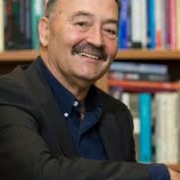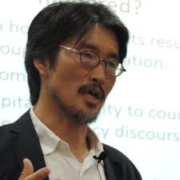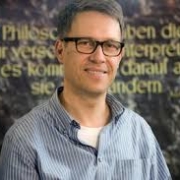Yong Zhao
COVID-19 as an opportunity for educational change
There’s an urban legend that Winston Churchill, near the end of World War II, once said “never let a good crisis go to waste.” President Obama’s chief of staff, Rahman Emanuel, certainly said similar words in 2009 after the Global Financial Crisis. Is the crisis in education today caused by the coronavirus an opportunity to make lasting and positive change? How can we be sure not to waste this moment by returning to normal?
Yong Zhao joins me to talk about educational change in the time of COVID-19. He argues that we must change the “yes, but” attitude to a “yes, and” collaborative approach. We must be innovative and work together to redesign education systems into something new. He’s hoping to see more self-directed learning emerge out of this crisis as well as a shift towards the humanities and philosophy.
Yong Zhao is a Foundation Distinguished Professor in the School of Education at the University of Kansas. His newest book is entitled Teaching Students to Become Self-Determined Learners (ASCD, 2020).
Citation: Zhao, Yong, interview with Will Brehm, FreshEd, 197, podcast audio, May 4, 2020. https://freshedpodcast.com/yongzhao-2
Will Brehm 2:09
Yong Zhao, welcome back to FreshEd.
Yong Zhao 2:11
Well, thanks Will. I’m happy to be back.
Will Brehm 2:13
So, let me ask you a question. When did you realize that the pandemic was going to have a major impact on education?
Yong Zhao 2:19
Well, it was while back, I think in January, I wrote a blog post to say, what if this is going to force schools to close for one year or more than a year. And at that time, I was really more thinking about it as a thought experiment. I posted a blog post and asked people at a major conference, somewhere in January, February. That was a good time to start thinking about this.
Will Brehm 2:44
Yeah. And I mean, now, obviously, that idea of closing schools for one year doesn’t seem too far-fetched.
Yong Zhao 2:50
It doesn’t, right! I mean, a lot of schools are thinking about opening next year. It’s not too far distant, which was an unfortunate prediction.
Will Brehm 2:58
Yeah. So, now as we sit here thinking about what this means for education, and I think a lot of us have more time on our hands as we’re self-isolating all over the world, what do you think some of the most important issues are that we as education researchers, educators, teachers. What should we be considering going forward?
Yong Zhao 3:18
Well, I think that there are really two sets of issues. One is, how do we rethink about education? This time, I think it is a crisis. A lot of people are trying to manage it as a crisis. But I think perhaps we should get our mind beyond the crisis to look for the opportunity that lies within it. I think it exposes a lot of issues with traditional education. Like, for example, our students are not that self-determined, self-directed learners and when they are on their own, can they learn? How they learn, I think lifelong learning skills have become more important. Another part of the issue is with the exposure of massive inequity in different homes, different families, people are really becoming to realize home environments. Even though research has shown that for a long time that home environments matter, and now but suddenly we discovered it truly matter, and matters a lot. We’ve come to live with those things. Life encounters. Not only they don’t have access to the equipment, to the connection, but really to the home environment, the support. So, this is very important. But there is another set of issues that really deeply concerns me is what the pandemic has shown is how humanity really has not been taught in schools. I think you look at the ugly side of politics. The rise in xenophobia, racism, and isolationism. And this is quite unfortunate. The politics that politicians play. But again, I want to say politics and politicians were a product of our schools too, and our voters you know, how come we have not managed that? I’m very concerned about the social disintegration after this. The rise and clash among different groups, of different people. So, I’m really thinking about how education has lost that battle in teaching about human interdependence. While we were focused on STEM, numeracy and literacy, we forgot another major thing. Education is about educating human beings.
Will Brehm 5:28
So, do you honestly think that this pandemic will really start forcing schools and education systems generally, to shift away from the focus on STEM to say the humanities? Do you think that will actually take place?
Yong Zhao 5:43
No.
Will Brehm 5:44
Are you hopeful?
Yong Zhao 5:44
No, it won’t. It won’t. So, what I took is that —I remember several years ago, people asked me to write about the future of education. I said, “well, do you want me to write as a forecaster, or do you want, right as an interventionist, or an intervener?” And I think last week, on our show called Silver Lining for Learning, Chris Dede, out of Harvard, said the same thing. He said “okay, we’re not here to forecast the future but to create the future”. So, what you are describing is what I wish we could create. I think that’s why maybe we’re doing this podcast. I want to say, “okay, let’s take actions! I don’t think by and itself is going to happen necessarily unless with efforts to say, let educators, education thinkers begin to think about how do we deal with honestly, the collapse of a globally-connected humanity in the future? How can education shift away from simply educating economic competitive beings like OECD has been promoting and we need to rethink about really, PISA means nothing. Honestly, all those kind of things, all the test scores mean nothing unless human beings learn to respect each other, to create value for each other, to be dependent on each other, to understand that we are in this together.
Will Brehm 7:02
It does make me think. The PISA scores that came out not too long ago, they really seem irrelevant right now during a pandemic. Like how many people are honestly talking about PISA?
Yong Zhao 7:14
Right? Yeah, yeah. Well, that’s right. And it’s also stupid. If you look at the PISA scores, if those countries truly had good education, what does that mean? Are they becoming more globally concerned? Are they really contributing more to humanities? All those things, I think, fall into question of PISA. PISA has been driving the global economy, the knowledge economy for too long. Let’s talk about the global humanity, the global society, the global community, is a better term than global economy.
Will Brehm 7:47
In your newest blog post that you just posted yesterday, which was Wednesday. You talk about this idea of educational change and how we need to move the conversation from “Yes, but to Yes, and”. What do you mean by this idea of approaching education with an attitude of “Yes, and”?
Yong Zhao 8:08
Well, the idea is that -I’m sure Will, you run into this on your show and in many other occasions. We have a lot of people say, we agree that education needs to have a big change, a paradigm shift to do this…but. So, we have all this reasons to say but: but our leaders don’t support it, but our government is stupid, but we have this stupid test, but students have to go to college, but we don’t have the money. All those kind of things -but parents may not like it. My view is that all the buts are workable problems. So, how about we say “yes, and”…let’s do something about it. I think that’s really the major thing. I think a lot of the obstacles are either imagined or real. But either way, if we want to make change, we have to take action. So, let’s not wait for somebody else to take the actions. I think a lot of times, I have that conversation with people, I do hear a lot of them ask how to change the system, which is like, how do you change gravity if you want to fly? Why would you even ask that question? It’s not going to change unless we take action.
Will Brehm 9:13
Right. But one thing I worry about is change in more of the negative direction, right? So, like, after the 2008 financial crisis, there was lots of change, say, particularly in the higher education sector in America, where funding really dried up for a lot of state universities and had other impacts on other levels of higher education as well. So, you know, how do we do the “Yes, and” for educational change, but in directions that are actually positive rather than perhaps having these negative long term consequences, like happened after the 2008 financial crisis?
Yong Zhao 9:49
Well, I mean, I think a big thing Will, is to say, okay, who is making those decisions? Can we influence? When I say there’s no guarantee it’s going to be for, necessarily, the positive. It only says okay people with the positive change, or mindset. People with those good ideas need to take action. If there are more people taking action in that direction, you’ll probably get that. And if we just worry about those people who are going to make negative decisions, and there’s no one to combat them, that’s going to happen. At least, we have a chance to try. I don’t think there’s anyone that can guarantee the outcome but without trying, we can be sure of the outcome that’s going to be negative.
Will Brehm 10:10
And what would you say to parents that are at home, trying to work, trying to take care of their children, trying to teach their children through all these online methods that have sort of emerged very quickly of late. For parents trying to just sort of survive this pandemic, how can they also be part of this educational change that you’re talking about?
Yong Zhao 10:51
Well, parents are absolutely, absolutely, absolutely one of the most important elements of this change. I think there are several things. One is that I think all parents should be thinking about what education is, not what school is. Not think about the children’s job is to comply with school demand, but to think about what kind of education their children actually need. And I think parents in different countries now realize that maybe the homework schools ask kids to do is not that meaningful. Maybe family connections, understanding community, may be more important. And also, for some families, their children who haven’t been doing well academically, I think not all parents, maybe need to rethink about maybe that’s not as important. We also need to think about, right now, if they want an education that they know, and if there’s one education they want but they have not been happy, it’s time to take action. They have kids at home, they can work with schools, they can renegotiate this. I think during crisis mode, a lot of things are more possible. So, I think parents need to think about again, what a good education is.
Will Brehm 12:02
That’s right. It also makes me think about one of your friends and colleagues, Pasi Sahlberg and his new book with William Doyle, who I’ve interviewed both of them for this show previously, all about letting children play as a real form of learning and education. And it seems like such a simple idea but yet it is actually quite radical. And I wonder, is the pandemic a moment where we can really try and embrace that idea of just letting children play?
Yong Zhao 12:31
Well, I think I’m sure. Pasi has said a lot more than the typical understanding of “play”. I think there is some interesting things about play. So, I would like to say, yeah, let’s play. In many ways, you and I are playing with ideas. We’re playing with the possibilities. I think a lot of times you know, like some people will think play can simply be watching YouTube videos as play. I think play is active engagement in certain activities. You invent the rules. You play with a group, play with other people, you play with concepts, you try to advance. I love the idea of play, but another person wrote a wonderful book called Lifelong Kindergarten. Mitchel Resnick talks about every school should be like kindergarten. I think it’s definitely valuable but anything Pasi writes I would endorse. So, it’s a very wonderful thing that you talked to Pasi and I think it’s a good approach. But many people have been advocating play and I do kind of get a bit concerned. A lot of times that could be misinterpreted as some just let go, with whatever.
Will Brehm 13:36
Yeah, right. So, there needs to be a little bit of structure built into it as well.
Yong Zhao 13:40
Yeah.
Will Brehm 13:40
You know, as we sit here and we think about what education is going to look like, and we imagine what education is going to look like in the future, a lot of it, a lot of the learning that has taken place is now online. Online learning has become a very popular mode of instruction at this point. In your opinion, is there anything that worries you about online learning?
Yong Zhao 14:03
Oh, a lot. Again, I wrote several blog posts about this. So, my view is this, is that I’m a practical person to say, “well, right now if online is the only thing we have, let’s make the best of it”. Online can never replace physical schools and physical schools cannot be online anyway. That’s why I wrote this whole series called “Tofu is not Cheese”. You cannot make it the same. I think a lot of things worry me. First off, just having children staring at a screen for 10 hours. That’s just deeply concerning. Second thing that worries me the most actually is that our children have not been inducted or helped to live, socialize, learn online. I think a lot of times if you look at our schools, we have been talking about digital competency, all those things, but we seldom model that. I call this as a digital world that has its own culture, its own ways, but our children have not been socialized in doing that. So, a lot of times that way to learn, it’s a different norm. How do we learn there? It’s very important. I think that’s another piece. When our children are not really helped or develop those ways of wisdom to manage devices, manage your time, manage friendship, manage understanding, what’s fake news, what’s not, I think that’s very concerning to me. So, this might be a good opportunity to help our children cultivate the competency we need, the wisdom we need to live in a digital world.
Will Brehm 15:34
Hmm. I really do like the idea that in these times of crises there are opportunities to think differently going forward. And what worries me, I guess, is going back to the original blog post that you wrote in January about contemplating the idea of having schools closed for 12 or 18 months. It seems to me that this is going to cause a lot of stress on families to manage the schooling or the education of their children, manage paychecks, manage getting food on tables. So, in what ways can we begin to mentally prepare for this long haul that we’re probably going to have to live through and exist in as we wait for some of these social institutions that are so vital to families and communities to come back online?
Yong Zhao 16:21
Well, I think when we talk about resilience we talk about hope. I think this is the time to really learn about this. Human beings have gone through this: massive wars, and big decline, disasters, influenza of 1918. We’ve gone through this but hopefully we can manage it better. But I think that’s why at this time, we need to unite to think about, to help others. To understand a lot of times how fortunate we are, how we can create value for others. This is a great education lesson for humanity. I think the big thing, how we get through, is really hope and creativity. A lot of social institutions and economic institutions have been disrupted. Lots of people have no jobs, we’re going to see more food shortage, we’re going to see medical supply shortage, we’re going to see economic downturns, we’re going to see entire industries being wiped away or dramatically shrinking but there is hope. The hope relies on how creative we can be as individuals and as collectives. How do we use this opportunity to rethink? And that is not, honestly right now, seen a lot at the political leadership level. That’s why I hope youth voices, children, students, they will rise to lead, to think. And another thing, I hope this will wake up a lot of educators who have been overly practical in many ways. In education, we have been for the past several decades trying to become more mechanical, more technical. Trying to assess every point, to exam everybody, to hold everybody accountable, to treat teaching as a mechanical dispensing of knowledge or information, not trying to make it a humanized activity. I think in education, we need a lot more, honestly, philosophers than so-called evidence-based people. The evidence-based movement has been a very big problem you know. You kept looking for evidence but evidence of what? That’s why I wrote the book called What Works May Hurt. If you only look for evidence of what works, but if it hurts, do you still want that? But more importantly, the traditional research you know, we talked about RCT (randomized controlled trials), the golden standard of research does not lead you to a better future. It does not need medicine. It only verifies if it works. So, I think we need, really, philosophers. We need big thinkers in education. Another big issue, of course, coming to education research, I have a lot to say about it, is that if you look at education researchers, we are only researching what’s possible with the existing confinement. We study teacher-student relationship. You imagine one teacher with 25 students in one classroom with the same curriculum. But that’s artificial. If you change the organization, the arrangement, it changes, right? If we only studied about how leadership matters, but you’re still leadership leading in one school, but once that change, it changes. So, I think we need a lot more reimagination, more hope?
Will Brehm 19:22
Well, I hope that you are right that this pandemic will sort of engender a lot of these new ideas, create the conditions under which new ideas can emerge and hopefully put into action. So, I’m with you on the “Yes, and” philosophy here going forward. Yong Zhao, thank you so much for joining FreshEd again. Always a pleasure to talk and you’re welcome back anytime.
Yong Zhao 19:44
Thank you. Thank you, Will. Good luck and by the way, as I wrote in my last book, called An Education Crisis is a Terrible Thing to Waste, I think a lot of education systems have been getting worse because we go after PISA and other test scores as a mechanical improvement. We need to rethink about this. Not waste the crisis. So, we have a double crisis: the COVID crisis and the long-standing education crisis. I hope Will, through your voice, and we will be able to come up with a better future. Thank you very much.
Will Brehm 20:14
Thank you. I hope so too.
Coming soon.
Coming soon.









